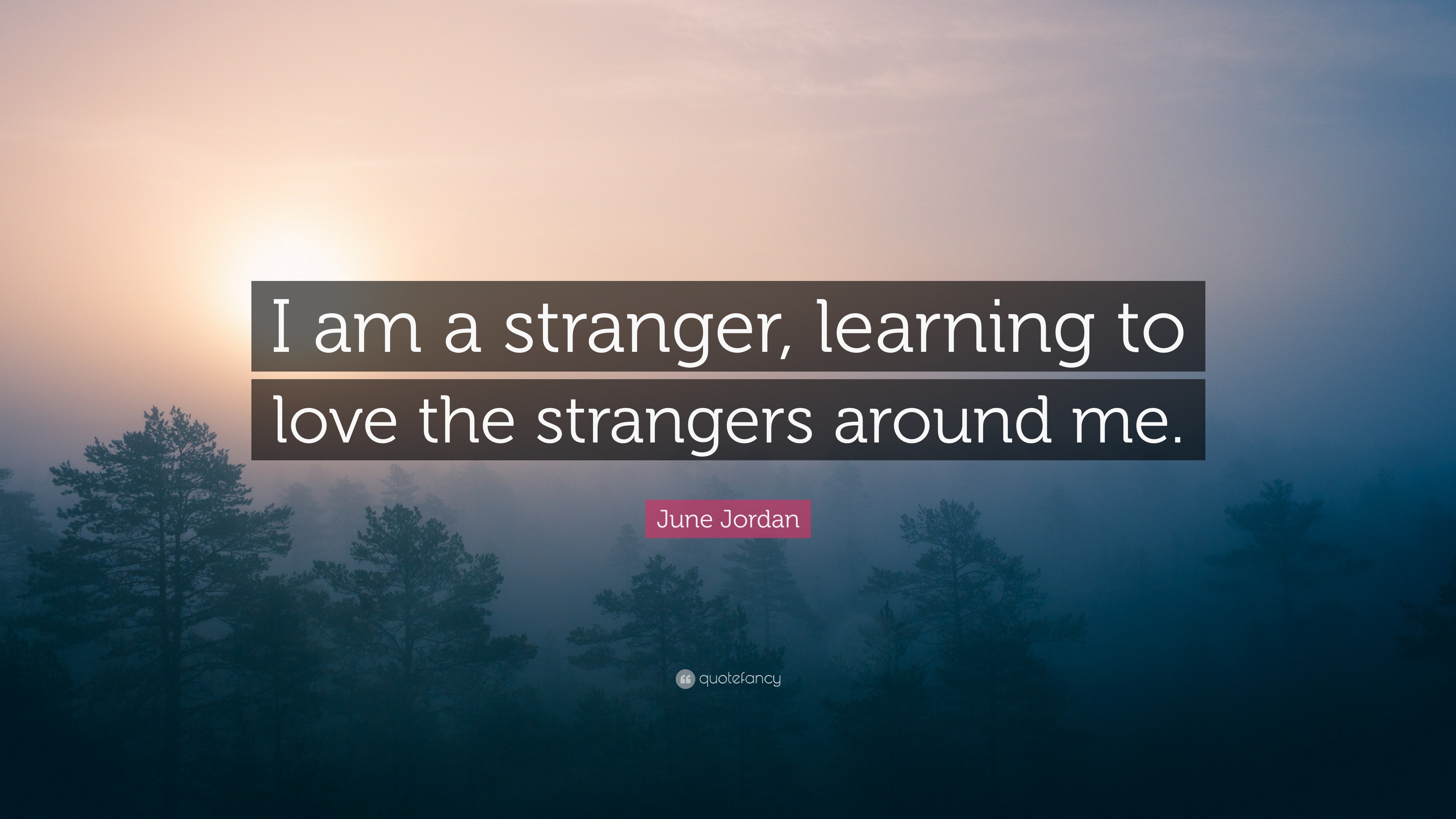Love strangers? Sounds like a contradiction, right? We often hear about loving family, partners, or friends, but what about those random people we cross paths with in our daily lives? Love strangers is more than just a catchy phrase—it’s a philosophy that’s gaining traction in today’s fast-paced world. It’s about embracing the beauty of human connection, even with those we barely know.
Think about it. How often do you smile at a stranger on the street or strike up a conversation with someone in line at the coffee shop? In a world that feels increasingly divided, loving strangers might just be the antidote we need. It’s not about romantic love or even friendship—it’s about extending kindness, empathy, and understanding to everyone you meet.
This isn’t just some warm-and-fuzzy concept, though. Studies show that small acts of kindness can have a ripple effect, improving mental health, fostering community, and even boosting your own well-being. So, if you’re ready to dive into the world of loving strangers, stick around. This article will cover everything you need to know, from the science behind it to practical ways to practice love strangers in your everyday life.
Read also:Aimee Garcia The Rising Star Who Stole Our Hearts
Table of Contents:
- What is Love Strangers?
- Biography of the Concept
- Psychology Behind Love Strangers
- Benefits of Loving Strangers
- How to Practice Love Strangers
- Common Misconceptions
- Real-Life Examples
- Overcoming Challenges
- Scientific Studies
- Final Thoughts
What is Love Strangers?
So, what exactly does it mean to love strangers? At its core, it’s about shifting your mindset from indifference or even hostility toward strangers to one of compassion and connection. It’s about recognizing the humanity in everyone, regardless of how briefly you interact with them.
Love strangers isn’t about becoming best friends with every person you meet. Instead, it’s about those small, meaningful moments—like holding the door open for someone, offering a compliment, or simply acknowledging their existence with a smile. These tiny gestures can create a ripple effect of positivity that extends far beyond the moment.
Why Is Love Strangers Important?
In today’s world, where social media often amplifies division and negativity, loving strangers offers a refreshing alternative. It’s a way to counteract the loneliness and isolation many people feel, even in crowded cities. By choosing to love strangers, you’re contributing to a culture of kindness that benefits everyone.
Biography of the Concept
The idea of loving strangers isn’t new, but it’s taken on new meaning in recent years. Philosophers and spiritual leaders have long advocated for treating others with kindness and compassion, but the phrase “love strangers” has gained popularity as a modern rallying cry for connection.
Some trace the concept back to ancient teachings, like the Golden Rule: “Do unto others as you would have them do unto you.” Others point to modern movements, such as the random acts of kindness trend or the rise of mindfulness practices. No matter its origins, the message remains the same: we’re all connected, and our actions have the power to make a difference.
Read also:Liam Hemsworth The Rising Star Who Owns Hollywood
Data Table: Key Figures in the Love Strangers Movement
| Name | Role | Contribution |
|---|---|---|
| Martin Luther King Jr. | Civil Rights Leader | Advocated for nonviolence and love as tools for social change |
| Thich Nhat Hanh | Buddhist Monk | Emphasized mindfulness and compassion in everyday interactions |
| Mother Teresa | Humanitarian | Devoted her life to serving the poorest of the poor |
Psychology Behind Love Strangers
There’s actually a lot of science behind the idea of loving strangers. Studies show that when we engage in acts of kindness, our brains release feel-good chemicals like dopamine and oxytocin. This creates a sense of happiness and connection, not just for the recipient but for the giver as well.
One fascinating study found that people who performed random acts of kindness for others reported higher levels of life satisfaction and lower levels of stress. Another study discovered that witnessing kindness can inspire others to act kindly themselves, creating a virtuous cycle of positivity.
Key Findings
- Acts of kindness boost serotonin levels, improving mood and reducing anxiety.
- Compassion strengthens social bonds, fostering a sense of community.
- Empathy helps us understand others’ perspectives, reducing conflict and increasing cooperation.
Benefits of Loving Strangers
Now that we’ve covered the science, let’s talk about the practical benefits of loving strangers. Here are just a few reasons why this philosophy is worth embracing:
1. Improves Mental Health
Engaging in acts of kindness has been shown to reduce symptoms of depression and anxiety. It gives you a sense of purpose and fulfillment, reminding you that your actions matter in the grand scheme of things.
2. Builds Stronger Communities
When people feel valued and appreciated, they’re more likely to contribute positively to their communities. Loving strangers can help break down barriers and foster a sense of belonging.
3. Enhances Personal Growth
Practicing love strangers challenges you to step outside your comfort zone and see the world from different perspectives. It encourages empathy, patience, and understanding—qualities that are essential for personal development.
How to Practice Love Strangers
Ready to start loving strangers? Here are some practical tips to get you started:
1. Start Small
You don’t have to overhaul your entire life overnight. Begin with simple gestures, like saying “thank you” to your barista or complimenting someone on their outfit.
2. Be Present
Give your full attention to the people you interact with, even if it’s just for a few seconds. Put away your phone and make eye contact. This shows that you value them as individuals.
3. Listen Actively
Sometimes, the best way to love strangers is by simply listening. Pay attention to what they’re saying, ask questions, and show genuine interest in their stories.
Common Misconceptions
There are a few misconceptions about loving strangers that are worth addressing:
1. It’s Too Idealistic
Some people think that loving strangers is unrealistic or naive. While it’s true that not everyone will respond positively, that doesn’t mean it’s not worth trying. Every act of kindness, no matter how small, has the potential to make a difference.
2. It Requires a Lot of Time
You don’t need to dedicate hours of your day to loving strangers. Even a quick smile or kind word can have a big impact. It’s about quality, not quantity.
Real-Life Examples
Let’s look at some real-life examples of people who have embraced the love strangers philosophy:
1. The Pay-It-Forward Movement
Started in coffee shops, this movement encourages customers to pay for the drink of the person behind them in line. It’s a simple yet powerful way to spread kindness.
2. Community Gardens
Many cities have community gardens where strangers come together to grow food and share resources. These spaces foster connection and collaboration among people from all walks of life.
Overcoming Challenges
Of course, loving strangers isn’t always easy. There are challenges to overcome, but with the right mindset, you can navigate them successfully.
1. Fear of Rejection
Not everyone will respond positively to your kindness, and that’s okay. Remember that your actions are about intention, not outcome. Keep showing up with love and compassion, even if you don’t always get the response you hope for.
2. Time Constraints
Life is busy, and it’s easy to get caught up in your own schedule. However, loving strangers doesn’t have to be time-consuming. Even small gestures, like holding the door open or offering a kind word, can make a big difference.
Scientific Studies
For those who need a little more convincing, here are some scientific studies that support the benefits of loving strangers:
1. The Kindness Experiment
A study conducted by researchers at the University of California found that people who performed acts of kindness for strangers reported higher levels of happiness and life satisfaction.
2. The Ripple Effect
Another study demonstrated that witnessing kindness can inspire others to act kindly themselves, creating a chain reaction of positivity.
Final Thoughts
Love strangers isn’t just a feel-good concept—it’s a powerful way to transform the world, one interaction at a time. By choosing to extend kindness and compassion to everyone you meet, you’re contributing to a culture of connection and understanding.
So, what are you waiting for? Start small, be present, and keep showing up with love. Who knows? You might just inspire someone else to do the same. And remember, every act of kindness, no matter how small, has the power to change lives—including your own.
Feel free to share your thoughts in the comments below or check out our other articles for more inspiration. Together, we can create a world where love strangers isn’t just a phrase—it’s a way of life.


